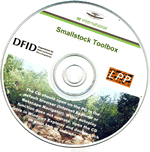Toolbox Smallstock in Development | Increasing the value of production from smallstock has an important role to play in poverty reduction.
The Smallstock Toolbox focuses on the role and importance of smallstock in development and poverty reduction. The toolbox aims to provide a range of practical information and descriptions of techniques and "tools" to assist in increasing the efficiency of operations of smallholders and the productivity of their animals.
Livestock in general, and smallstock in particular have a particularly important role to play in enhancing the livelihoods of the poor.
In poor households, these animals are often kept under scavenging conditions with little or no attention paid to supplementing feed inputs, or to disease control and housing. At the same time, these animals provide products for cash sale when a need arises, and provide the household with much needed protein.
The Smallstock Toolbox focuses on the role and importance of smallstock in development and poverty reduction. The toolbox aims to provide a range of practical information and descriptions of techniques and "tools" to assist in increasing the efficiency of operations of smallholders and the productivity of their animals.
Information Products
The DFID Livestock Production Programme (LPP) is producing customised pro-poor information products on CD-ROM which are aimed at specific audiences – including civil society practitioners, extension agents, researchers, policy makers and literate farmers. These CDs include Knowledge Banks for Researchers, e-Libraries and Toolboxes for practitioners such as NGOs, extension agencies, farmer organisatons, and policy makers.
Rationale for the Smallstock Toolbox
The Challenge for Smallstock in Development
Livestock are an important part of the livelihood systems of many poor rural and urban populations in developing countries. Livestock also play an important role in farming systems and can decrease the vulnerability of households. Smallstock are important as they are more accessible to greater numbers of poor households.
Building on Experience
The toolbox does not attempt to provide all the answers to what is a large and complex topic, but is based on the experience of recent research carried out by DFID's Livestock Production Programme and other bodies. This is supported by background information, further reading, and specialist information sourced from a wide range of organizations involved with livestock and with development.
A Resource
This toolbox forms a resource for use by NGOs, extension workers and others involved in livestock development. The primary purpose is to provide those institutions or individuals that inform or interact with resource-poor farmers, groups of livestock keepers or farmer organisations and extension services, with appropriate information in a readily accessible manner to assist in tackling some of the problems they face. The tools include technical interventions, husbandry advice, policy change guidelines and empowerment suggestions. The overall scope is to improve the management of knowledge generated by research and generally improve the communication between farmers and the research institutions.
Comments
CIRAD © 2007 (All rights reserved) - Disclaimer stating - Page updated : 02/04/2007
